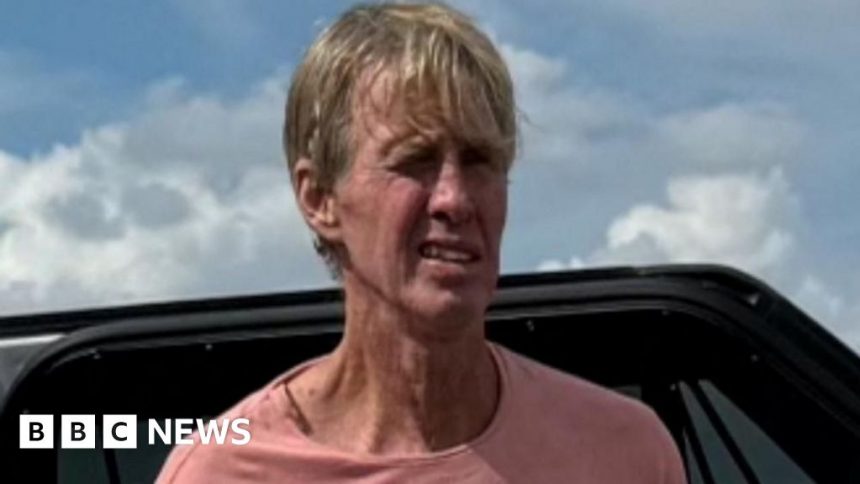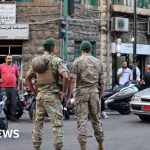In Ukraine, Trump plot suspect remembered as a ‘delusional’ reject
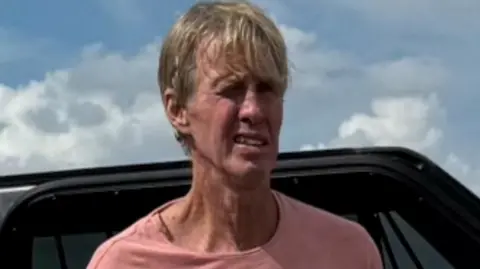 Reuters
Reuters“We can’t say why we’re here, it’s top secret!”
I’d never asked what the drunk British man in strange military fatigues was doing in a Ukrainian cafe, but he was keen to tell me regardless.
It was the summer of 2022, and dotted across Kyiv’s main Khreshchatyk Street were similar types who all claimed they were joining Ukraine’s war effort against Russia.
“War attracts all sorts,” I thought.
We now know they included Ryan Routh, the suspect in an apparent attempted assassination of Donald Trump in the US on Sunday.
Routh “was an omnipresent dude” in the Ukrainian capital, remarks Chris Lutz, an aid worker who met him several times.
“I wouldn’t call him crazy,” he says. “He was trying his best to help Ukraine, but it was getting to an unhealthy level.”
- What we know about Ryan Routh so far
- Gunman lurked for hours before Trump’s last-minute game of golf
- Trump says he was bundled into golf cart after shots rang out
- BBC Verify: How much security does Trump get?
Ukrainian officials have firmly distanced themselves from the man accused of trying to assassinate Donald Trump at the former president’s Florida golf course.
Routh, 58, had repeatedly tried to recruit foreign soldiers for the Ukrainian military, but was unsuccessful.
“He has never served in Ukraine’s International Legion and has no relation to the unit,” said the legion’s spokesperson.
The American reportedly contacted the legion on a regular basis with ideas described by one Ukrainian soldier as “nonsensical” and “delusional”.
The suspect had also admitted to being turned down himself, claiming it was down to his age and lack of fighting experience.
In an online post reacting to the events in the US over the weekend, Ukrainian President Volodymyr Zelensky said he was “glad” Donald Trump was unharmed.
There was no mention of the suspect who’d been a staunch supporter of Zelensky’s country – and for good reason.
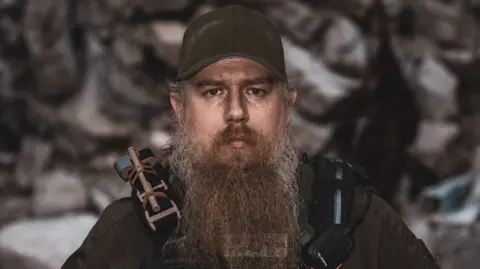 Patrick Enssle
Patrick EnssleA Ukrainian headache
Three days after Russia’s full-scale invasion, Zelensky called for “friends of peace and democracy” to join the fight from abroad, and they did so in their thousands.
Ukraine’s International Legion was born.
It was initially thought 20,000 volunteers were willing to sign up. Experts now think there are more than 4,000 foreign fighters in Ukraine.
Despite the fact Routh failed in his attempts to add to that number, his arrest in Florida has still given Kyiv a headache.
Lt Andriy Kovalenko, who’s from Ukraine’s National Security and Defence Council, warned Russia would use the assassination attempt for propaganda purposes.
“Playing with fire has its consequences,” was the response from Kremlin spokesman Dmitry Peskov when asked whether Ukraine could have been behind the plot.
On Russian state TV, host Olga Skabeyeva called Routh a “crazed fan of Zelensky, walking around with a machine gun”.
“There has been another attempt on Donald’s life, and the attempt is officially linked to Ukraine,” she added, making reference to an earlier effort by a gunman in Pennsylvania to shoot Trump in July.
A popular pro-Russian Telegram channel in Ukraine claimed the Ukrainian intelligence service was behind the assassination attempt. A similar account said the American had travelled to Ukraine to “recruit American mercenaries”.
No evidence has accompanied these claims.
“Of course, all this is a lie,” said Lt Kovalenko. “But information confrontation is a component of the war.”
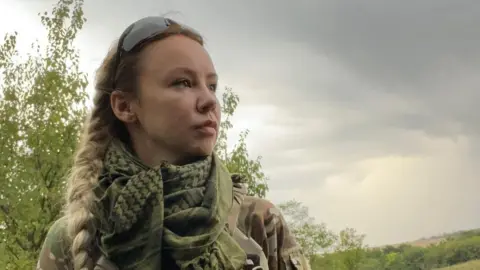 Instagram/Sandra Anderson Eira
Instagram/Sandra Anderson EiraSandra Andersen Eira, a Norwegian national fighting with the Ukrainian Marine Corps on the southern front line, says she is puzzled.
“My only question is: how did he get rejected by the International Foreign Legion?” she asks.
She says that until last May there was very little vetting. A minimum contract of six months and basic training have since been brought in.
Recruits still don’t have to have any military experience, though some consider this to be an advantage. “Routh was just another one of those types,” Ms Eira says.
“You had characters fundraising, scamming people, claiming to be in the front lines, with a unit, and then they’re not.
“Some volunteers have good intentions and really want to make a difference, but maybe they’re just not mentally or physically fit for it. Some of them are just delusional.”
Perhaps this applied to Ryan Routh.
He might not have helped Ukraine, but his time in the country has given it an unwelcome connection to an assassination attempt on a US presidential candidate.
Additional reporting by Hanna Chornous and Charlotte Scarr




